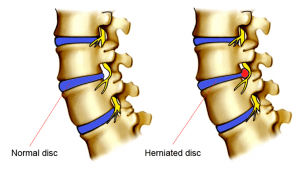How do I know if I have a slipped disc – What are the common signs and symptoms?
Some of the symptoms that individuals with slipped disc may experience are:
- Pain when coughing or sneezing
- Pain worsening during extension of low back, sitting or standing
- Numbness, tingling sensation that radiates to the limbs
- Weakness of muscles
How is it diagnosed?
Slipped disc are generally diagnosed with a series of physical tests, neurological tests and diagnostic imaging. The gold standard for diagnosing a slipped disc is through a Magnetic Resonance Imaging (MRI).
An MRI allows a physician to analyse the state of the disc tissues in detail (i.e. annular tears, disc herniation) the extent of the damage and which levels of your spinal (intervertebral) discs have been affected.

How does slipped disc affect my body?
Disc material that are protruding out of the disc space, will reduce the space within the spinal column. The spinal column which allows the spinal cord and nerve roots to run through it. This enables the central nervous system of the body to carry out its function, which is to send messages (nerve impulses) to all parts of the body (i.e. vital organs, muscles). When the nervous system of the body is affected, it inhibits the body from functioning and carrying out its natural processes optimally.
This may lead to individuals experiencing neurological symptoms, such as muscle weakness, atrophy and unusual sensations (numbness and tingling) in the upper or lower limbs.
In addition, disc injuries do not only affect the musculoskeletal system of the body. Some may also experience effects on other systems of the body, such as endocrine and excretory, as the nerves also innervate the organs that help with bladder control and major hormone glands of the body.
Disc herniation may impinge on nerves that send messages to those specific organs, causing interruption to the normal flow of signals between the organs. Thus, a nerve impingement may affect the ability of your body to regulate and maintain your body’s homeostasis.
Here at Healthworks, we often see clients that are diagnosed with a slipped disc. With the use of our integrative healthcare services, we do our best to help clients achieve pain relief, have better joint movement and have a more active lifestyle.
Drop in and see us… don’t let the condition get the best out of you – ensure that you get the best out of your life!


